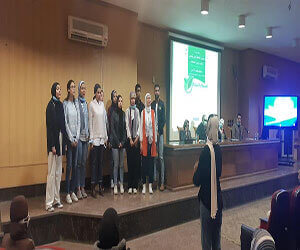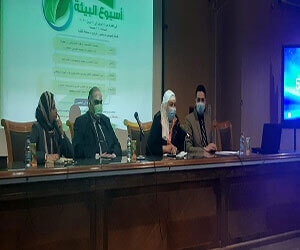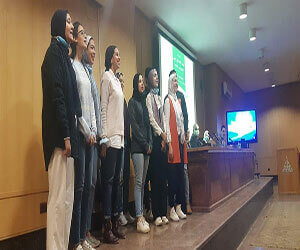"Environmental impacts of green buildings" ... The first symposium of the Environment Week in Ain Shams
Prof. Dr. Salwa Rashad, Dean of Faculty of Al-Alsun, inaugurated the first seminars for the Environment Week entitled "Environmental Effects of Green Buildings", which was launched by the Community Service and Environmental Development Sector at Faculty of Al-Alsun, Ain Shams University, in cooperation with the Education and Student Sector and Youth care Department, under the patronage of Prof. Dr. Mahmoud El-Metiny, President of the University, Prof. Dr. Abdel-Fattah Saoud, Vice President of Education and Student Affairs, Prof. Dr. Hisham Tamraz, Vice President of Community Service and Environmental Development, and the supervision of Prof. Dr. Yomna Safwat, Vice President of Community Service and Environmental Development, in the presence of Prof. Dr. Osama Al-Buhairi, Dean of the University's Institute of Agriculture in Arid Zones.
Prof. Dr. Salwa Rashad, Dean of Faculty of Al-Alsun at Ain Shams University, confirmed during her speech that the Environment Week comes within the framework of the cultural season for the 2020-2021 academic year, and comes in conjunction with the new openings witnessed by the faculty to develop its infrastructure to serve students in the first place. She stressed that the faculty’s awareness of the importance of comprehensive development comes in parallel with students ’sense of responsibility towards the new faculty’s facilities and the need to preserve them for future generations, stressing that the community service and environmental development sector in the faculty is working during the current period to implement the rules of social distancing, and indicated that the faculty has an electronic platform Its own highly efficient remote student service.
Prof. Dr. Yomna Safwat, Vice Dean of Community Service and Environmental Development, pointed out that the Community Service and Environmental Development Sector has a close relationship with environmental problems and development, especially since we face grave risks in light of pollution and mishandling of waste, the Environment Week coincides with the entry of the spring semester, to be a good opportunity to develop environmental awareness through its activities.
She stressed that the faculty has taken several steps to transform into a green faculty by adopting the electronic method and reducing paperwork as much as possible. There is also a gradual shift in the use of energy saved. The faculty has also taken several measures to combat smoking through the awareness campaign against smoking dangers that it launched in cooperation with the 100 campaign. Million health, as well as placing containers to recycle waste, and stressed that Environment Week launches a campaign to invite students to participate in the e-waste recycling campaign by reusing those wastes again after being recycled, the faculty also recycles and uses the items in its stores and limits the purchase On local products as possible.
 |
 |
 |
||
While Prof. Dr. Osama Al-Beheiry, Dean of the Institute of Arid Zones Agriculture at the University, stressed during the first seminars of the Environment Week, entitled "Environmental Effects of Green Buildings", that roof cultivation has become a vital requirement for the Egyptian state, especially after what the past decades witnessed of the erosion of green space in Cities and turning them into concrete gardens radiating high temperatures.
He explained that the idea is based on eco-friendly integrative farming so that vegetables and fish can be produced in the same model, as well as fish are fed on worms and algae, and plants are fed on fish droppings, and worms are fed on the resulting vegetable residues, which means that this model does not leave any harmful residues the surrounding environment
He pointed out that expanding the cultivation of roofs for residential buildings and various institutions is a matter that would return parks and green spaces back to the city, which was considered an outlet for the residents of these areas, which relaxes the soul and purifies the air.
He pointed out that the idea also contributes to reducing environmental pollution resulting from the increase in the areas of buildings with the lack of vegetation cover in the cities, pointing out that the cultivation of 1.5 square meters of green surface provides the individual with his oxygen needs for a whole year, as well as getting rid of the wastes that are stored on the roofs. Which causes distortion of the aesthetic appearance of the building and increases the chance of fires, and reduces the presence of various harmful organisms that invade homes as a result of living on neglected surfaces.
In conclusion, Prof. Dr. Salwa Rashad, Dean of the Faculty, and Prof. Dr. Yomna Safwat, Vice Dean of the Faculty, honored Prof. Dr. Osama Al-Beheiri, Dean of the Institute of Arid Land Agriculture at Ain Shams University, and delivered a shield and a certificate of appreciation for enriching the activities of the symposium.


.svg)




